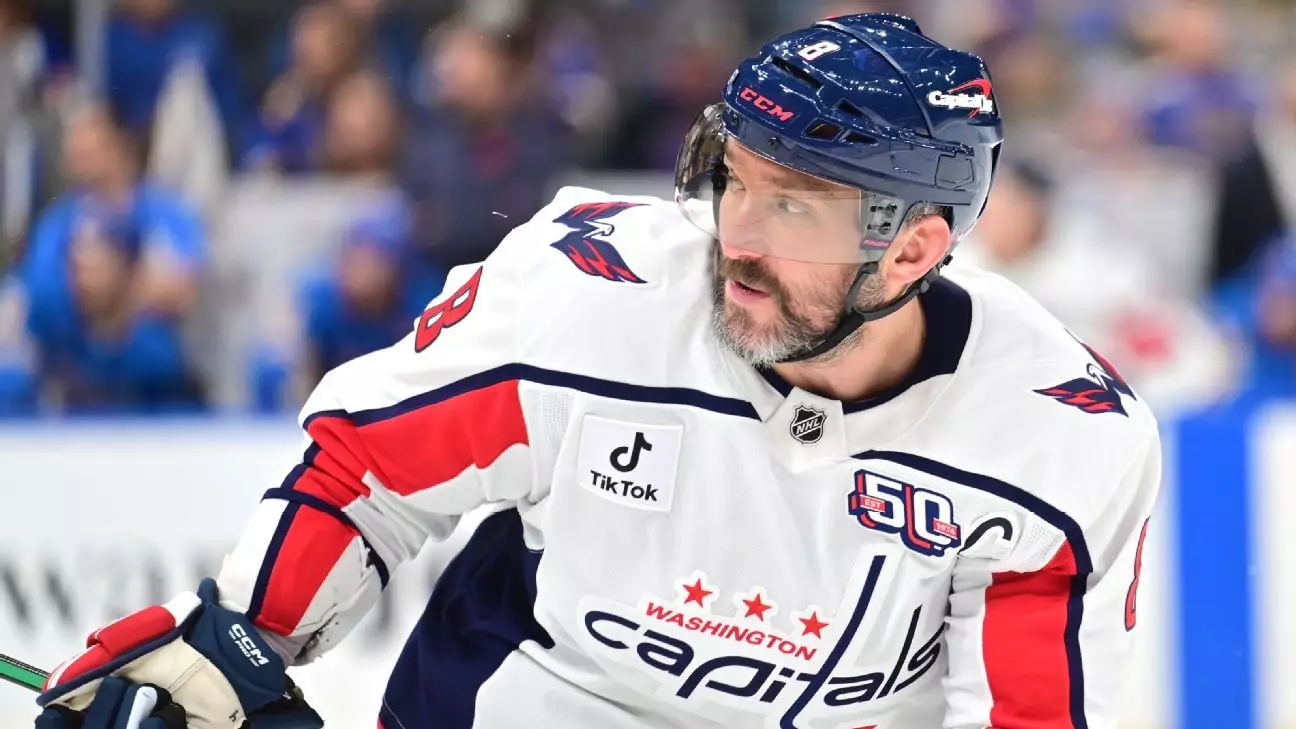In the NHL, few names resonate as profoundly as that of Alex Ovechkin. A powerhouse on the ice and captain of the Washington Capitals, his current stint on injured reserve is a stark reminder of the fragility of athletic prowess. The Capitals must now navigate the uncharted waters of competition without their legendary leader, who is sidelined with a lower left leg injury. As they brace for the next few games without him, the sentiment shared by teammates, coaches, and fans alike oscillates between disappointment and hope.
At 39, Ovechkin is not just a player but a living testament to the pursuit of greatness in the sport of hockey. His injury places a significant halt on his endeavor to surpass Wayne Gretzky’s hallowed NHL career goals record. For Ovechkin, this record is not merely a statistic; it is a historic milestone that has captured the hearts and minds of hockey fans across the globe. As his teammate Tom Wilson articulated, the hockey community feels a collective sense of loss and empathy for Ovechkin, who has invested years in pursuit of this goal. His absence from the ice is felt not only in Washington but also resonates throughout the league.
While Ovechkin was on a tear prior to his injury, racking up 15 goals in just 18 games, the heartbreaking incident suggests that the timeline for potentially breaking Gretzky’s record could significantly extend. Coach Spencer Carbery’s update on the situation reveals some optimistic notes about the nature of the injury; however, the uncertainty surrounding the recovery process continues to loom large.
The Emotional Toll on Teammates
The emotional ramifications of losing a teammate like Ovechkin cannot be overstated. Veteran defenseman John Carlson’s remarks underline the very human elements of professional sports. Hockey players, despite the competitive nature of their craft, are not devoid of feelings. They form deep bonds, and seeing a beloved captain struggle with injury weighs heavily on their morale. It’s a transformative experience that can unify a team while simultaneously testing their resilience.
Moreover, the situation exemplifies the inherent unpredictability of sports—an unexpected collision can abruptly change the trajectory of a season. For Carlson, who has shared countless moments both on and off the ice with Ovechkin, the locker room’s atmosphere shifts as they grapple with the absence of their leader. The collective “deja vu” echoes a sentiment recognized all too well by players: the fleeting nature of athletic opportunities.
For the Capitals, this period without Ovechkin necessitates an immediate restructuring of their offensive strategy. Ovechkin’s status on injured reserve is compounded by the long-term injury of winger Sonny Milano, which forces the team to look deeper into their ranks for solutions. The recall of young talent Ivan Miroshnichenko from the AHL yields mixed feelings—while the future looks bright, the pressure on some players to fill the void left by the captain can lead to undue stress and unrealistic expectations.
Jakub Vrana’s remarks reflect a hard-hitting reality: while Ovechkin is a monumental figure, hockey is a team sport. Each player’s contributions will become increasingly essential during this challenging period. While the Capitals’ roster includes familiar names from their 2018 Stanley Cup triumph, they must collectively step up to fill the gaps left by Ovechkin’s absence.
This adjustment period challenges the team to adapt quickly, fostering resilience and grit among them. It offers a chance for other players to showcase their talent and for the Capitals to cultivate a robust team identity, which will be crucial for maintaining competitiveness during Ovechkin’s recovery.
In the wake of Ovechkin’s injury, fingers are crossed for a swift recovery. Respected figures within the league, including opposing coaches, have recognized the importance of Ovechkin’s health and career ambitions. The absence of a player of his caliber inevitably alters the dynamics of the game, yet hopes remain high for a return that permits him to continue his historic chase for that coveted goal tally.
In the end, while Ovechkin may be physically absent from the ice, his spirit and resolve will undoubtedly linger within the Capitals’ locker room and resonate throughout the arena. The journey ahead is laden with challenges, but it may also serve as a catalyst for growth and unity within the team. As they navigate their upcoming encounters, the Capitals will need to draw on their shared history and collective strength to weather this storm, holding fervently onto the hope of Ovechkin’s eventual return.

